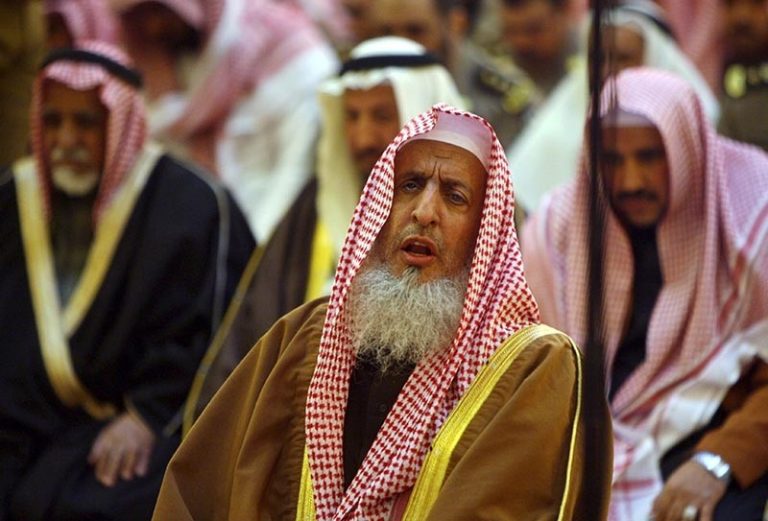
Bellnews reports that although the Saudi Royal Court confirmed his passing, it did not disclose his age or cause of death.
Multiple Saudi media outlets put his age at 82. Al-Sheikh’s death on Tuesday marked the end of more than two decades as the Kingdom’s top religious authority.
“With the passing of Al-Sheikh, Saudi Arabia and the Islamic world have lost a distinguished scholar who made significant contributions to the service of Islam and Muslims,” the Royal Court announced.
Funeral prayers were held after Asr at the Imam Turki bin Abdullah Mosque, Riyadh, with senior officials, scholars and citizens in attendance.
In line with Saudi custom, burial followed immediately at a nearby cemetery.
By directive of the Custodian of the Two Holy Mosques, King Salman, funeral prayers in absentia were also offered after Asr at the Grand Mosque in Makkah, the Prophet’s Mosque in Madinah, and mosques across the Kingdom.
Among dignitaries present were the Emir of Madinah, Prince Salman bin Sultan, who joined prayers at the Prophet’s Mosque, and Makkah Deputy Emir, Prince Saud bin Mishaal, who offered prayers at King Salman Mosque, Jeddah.
Worshippers prayed for Allah’s mercy, forgiveness and high rank in Paradise for the deceased.
Al-Sheikh’s Rise to the Highest Religious Office
Grand Mufti & Council Chief: In June 1999, King Fahd appointed Al-Sheikh Grand Mufti of Saudi Arabia, succeeding Sheikh Abdul Aziz Ibn Baz. He also led the Council of Senior Scholars, the government body that issues religious edicts.
Scholarly Lineage: A member of the Al ash-Sheikh family, he hailed from a lineage deeply rooted in Islamic scholarship.
Bellnews understands that the Makkah-born memoriser of the Qur’an lost his sight at the age of 17 and grew up as an orphan, yet pursued knowledge with resolve.
Al-Sheikh enrolled in 1961 at the College of Shariah, Imam Mohammad bin Saud Islamic University (Riyadh); graduated in 1965 with specialisation in Arabic and Islamic Shariah.
Academic and Preaching Career
1965: Appointed teacher at Imam al-Dawa Scholarly Institute, Riyadh (eight years).
Later joined the College of Shariah at the same university as an assistant and then associate professor; also taught at the Higher Institute of Judiciary, Riyadh.
Al-Sheikh served on several academic councils across Saudi universities. He served as Imam & Preacher, leading at the Sheikh Muhammad bin Ibrahim Mosque (Dakhnah, Riyadh), and as Friday Imam at the Sheikh Abdullah bin Abdullatif Mosque; later, he became Imam at the Imam Turki bin Abdullah Mosque.
In 1982, he was appointed imam and preacher of Namirah Mosque in Arafat. He delivered the pivotal Arafat sermon for 33 consecutive years (1982–2014), making him the most prolific Hajj preacher in history.
His sermons reached millions of pilgrims annually in Makkah and Madinah.
Key Appointments Before Grand Mufti
- 1991: Full-time senior member, Permanent Committee for Scholarly Research and Ifta.
- 1995: Appointed Deputy Grand Mufti. As Grand Mufti and head of the Council, Al-Sheikh issued fatwas on legal and social matters, emphasising Muslim unity and seeking to bridge divides among Islamic sects, while preserving tradition and addressing contemporary questions.
Notable Positions
- 2005: Issued a ruling banning forced marriages.
- 2018: Backed the decision allowing women to drive.
- 2004: Criticised the mixing of unveiled women and men at a Jeddah economic forum.
- Hosted a popular call-in radio show, issuing on-air edicts; in one ruling, described chess as the “work of Satan.”
- Al-Sheikh authored and inspired extensive works on fiqh, doctrine, and practical rulings, including:
The Book of Allah, the Almighty, and its Glorious Position
The Meaning of Our Testimony that Muhammad is the Messenger of Allah
A Collection of the Sermons of Arafah
Compilations from “Nur ‘Ala al-Darb” and other programs:
- The Book on Fatwas on Doctrines
- Fatwas on Purity and Prayers.
- Provisions and Fatwas on Zakat.
- Fatwas on Fasting.
- Fatwas on Hajj.
- Fatwas of Sheikh Abdulaziz Bin Abdullah Bin Muhammad Al Al-Sheikh.
- Messages of Sheikh Abdulaziz Bin Abdullah Bin Muhammad Al Al-Sheikh.
- Nur ‘Ala al-Darb Fatwas – The Book on Doctrines
- Nur ‘Ala al-Darb Fatwas – The Book on Purity and Prayers
Condolences From Across the Muslim World
Pakistan’s President Asif Ali Zardari and Prime Minister Shehbaz Sharif mourned the Grand Mufti’s death, calling it a “great loss” for Muslims worldwide.
The Supreme Fatwa Council of Syria, in a statement to SANA, lauded his decades of scholarship, guidance and Dawah, describing his contributions as “a great legacy in the service of Sharia.”
Egypt’s Grand Mufti, Dr Shawky Allam, offered condolences and prayers for the deceased and his family.
Blind since his teens yet unbowed in scholarship, Sheikh Abdulaziz Al-Sheikh’s wisdom, calm presence and deep knowledge made him a central voice in Saudi society.
Al-Sheikh’s sermons and rulings shaped public thought and policy, and his influence extended far beyond the Kingdom.

